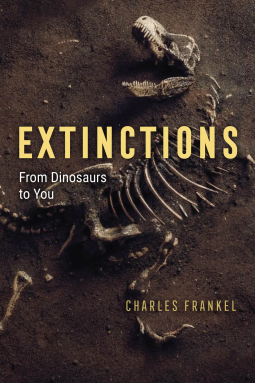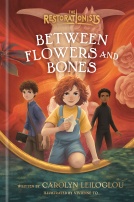
Extinctions
From Dinosaurs to You
by Charles Frankel
This title was previously available on NetGalley and is now archived.
Send NetGalley books directly to your Kindle or Kindle app
1
To read on a Kindle or Kindle app, please add kindle@netgalley.com as an approved email address to receive files in your Amazon account. Click here for step-by-step instructions.
2
Also find your Kindle email address within your Amazon account, and enter it here.
Pub Date May 29 2024 | Archive Date May 15 2024
Talking about this book? Use #Extinctions #NetGalley. More hashtag tips!
Description
On its face, the story of mass extinction on Earth is one of unavoidable disaster. Asteroid smashes into planet; goodbye dinosaurs. Planetwide crises seem to be beyond our ability to affect or evade. Extinctions argues that geological history tells an instructive story, one that offers important signs for us to consider. When the asteroid struck, Charles Frankel explains, it set off a wave of cataclysms that wore away at the global ecosystem until it all fell apart. What if there had been a way to slow or even turn back these tides? Frankel believes that the answer to this question holds the key to human survival.
Human history, from the massacre of Ice Age megafauna to today’s industrial climate change, has brought the planet through another series of cataclysmic events. But the history of mass extinction together with the latest climate research, Frankel maintains, shows us a way out. If we curb our destructive habits, particularly our drive to kill and consume other species, and work instead to conserve what biodiversity remains, the Earth might yet recover. Rather than await decisive disaster, Frankel argues that we must instead take action to reimagine what it means to be human. As he eloquently explains, geological history reminds us that life is not eternal; we can disappear, or we can become something new and continue our evolutionary adventure.
Advance Praise
“As Frankel guides us through ancient mass extinctions, we see with frightening ease our own species take charge over evolution’s dog-eat-dog, trial-by-fire way of forging new life. Even before we arrive at our present bind, Frankel demonstrates, past is prologue—at least if we don’t learn from it. This book provides a road map of the cruel realities of past extinctions and a warning, lest history repeat itself.” -- Ross Mitchell, author of 'The Next Supercontinent: Solving the Puzzle of a Future Pangea'
“This engagingly written book is a tour de force on the history and future of extinctions across the globe. Mastery of the subject matter is paired with clear appraisals of controversial topics in the field. This whirlwind tour of what we know and don’t know about past and future extinctions will better arm everyone to deal with our rapidly changing world.” -- Susan Solomon, author of 'Solvable: How We Healed the Earth, and How We Can Do It Again'
Available Editions
| EDITION | Other Format |
| ISBN | 9780226741017 |
| PRICE | $26.00 (USD) |
| PAGES | 288 |
Available on NetGalley
Average rating from 8 members
Featured Reviews
 Reviewer 725763
Reviewer 725763
From the asteroid strike that wiped out the dinosaurs to today’s climate crisis, understanding extinction events can help us mitigate their impact. This book argues that by changing our destructive tendencies, prioritizing biodiversity conservation, and redefining our role as humans, we can take transformative action and give Earth a chance to heal.
This book provides an interesting overview of mass extinction event, but focuses mainly on the Holocene. I found it a bit disturbing the way the author characterized megafauna extinctions as massacres by humans, when the most we can reasonably say is that humans outcompeted them. Humans aren’t to blame because we’re able to use natural resources more intensively than other species. It’s only in the past 50 years or so that we’ve begun to understand the dangers we present to the natural world. Talking about blame accomplishes nothing.
Humans are part of the ecosystems they live in. Any solutions to preserving species diversity must include addressing human needs and human nature. This book doesn’t go far enough in acknowledging that fact. People aren’t going to change, and it’s naive to suggest that they will.
Thanks, NetGalley, for the ARC I received. This is my honest and voluntary review.
This is a great in-depth look at the major extinction events that have happened in the past as well as what we might learn from them for the future. The End Cretaceous asteroid gets extra attention here and even though I've read other books on it (even T. rex and the Crater of Doom by Walter Alvarez, who started it all with his father), I found this one to be especially good at explaining what happened. But Frankel also looks at more modern extinctions, such as the large megafauna including woolly mammoths and giant cave bears that were most likely hunted into extinction by early hunters. He also goes into quite a lot of detail regarding current global warming trends and how that affects animals and plants. He wraps everything up with some suggestions for governmental policies going forward.
I probably enjoyed the first half of the book more than the second. Even though he said Chapter 3 (post Cretaceous recovery) was "somewhat technical and overly detailed in places" and "suggest[ed] skimming through the parts that appear too academic - except students of the earth sciences, of course," I found it very readable and understandable (even though I'm an informal student of such things). Honestly, I thought the parts about current global warming and modern species extinction rates were a bit more technical and detailed. Mr. Frankel has a good way with his explanations that helped to bring the history and situation alive in a way I've found lacking in other books.
The assessment of current times was somewhat depressing, even though he looks at it all in an almost clinical way. Other reviews have pointed out that humans come in for a lot of criticism at this point, and that's certainly true. I also believe, as Werner Heisenberg said: "... science started from the belief - or should one say, from the illusion? - that we could describe the world, or at least parts of the world, without any reference to ourselves." However, I didn't think Frankel was anywhere near as heavy-handed in this regard as others I've read, and in several places he pointed out that we need space and resources as well as animals and plants. But regardless, this was probably the best book I've read on the topic. 4.5 stars rounded up.
Extinctions by Charles Frankel is a thought-provoking and well-researched book on the history of planetary extinction events and the current biodiversity challenges which are either directly or indirectly attributable to homo sapiens. By putting both numbers in perspective and providing countless examples of species lost through the past centuries (with much more that we probably know nothing about) the author does a great service in illustrating the plight we find ourselves in while sharing the planetary ecosystem with other more fragile species.
There were two aspects that I found especially refreshing about this book, which I find too rare when reading similar books. First, by acknowledging the role of the economic model we have chosen for ourselves and thus the underlying "rules of the game" we are all abiding by in our consumption patters, the author helps in clarifying that it is in the end us and not those big bad companies out there that we should be wagging our fingers at when we read of yet another species extinctions. If we do indeed care for our ecosystems we need to step away from the cheapest ways of satisfying our (sometimes frivolous) needs and scrutinise our own consumption habits. Or allow some of our habits to be regulated against.
The other aspect was that I didn't close the book with a feeling of doom and hopelessness as some other books tend to stress. We need to vote in those political parties that are willing to mandate for biodiversity protection and thus transfer the costs of this from nature to the electorate, something that the country in which I live has yet again proven unwilling to do.
However, once we do find ways for ecological pressures to subside, nature shows a great resilience to heal itself and has a way of effectively refilling holes in its trophic pyramid. Let's hope we learn our lesson in time before the world is only populated by homo sapiens and the flora and fauna that it eats.
This books comes very highly recommended for those interested in biodiversity.
I adored Extinctions! As an anthropology student I felt that this was a great resource for understanding extinction.
What can we learn from past extinctions?
I thoroughly enjoyed this book. Charles Frankel looks at past mass extinctions over geological time to identify the causes and see whether there is anything we can learn from them. Over half the book looks at climate change and the ways we’re impacting our planet and draws on the information gleaned about the climatic conditions following previous events to make some very strong points about the consequences of our actions.
He also looks ahead to the things that could affect Earth and ultimately cause the extinction of our own species. I can recommend this book, it made me think about mass extinctions in a different way and gave me a lot of food for thought.
I was given this book from the author via netgalley only for the pleasure of reading and leaving an honest review should I choose to.
Fall is prime time for scary reads, but I never expected the scariest book I’d pick up this year to be “Extinctions” by Charles Frankel. It is not horror - it’s work of popular science exploring past extinctions and the mechanisms that drove them. Frankel doesn’t stop there, he examines the factors in play today and seeks out solutions that might help us stave off a looming ecological collapse. As you read, a sense of dread builds, gradually revealing just how a world-threatening crisis grows over time—and yes, that lingering feeling of impending doom is real
Charles Frankel, a renowned French geologist, skillfully guides readers across space and time with both ease and infectious passion. He connects geology, astronomy, zoology, climate science, sociology, and anthropology into a cohesive narrative that genuinely left me shaken. We are, Frankel argues, at the brink of the sixth great mass extinction on Earth. While “at the brink” may mean thousands of years in geological terms, the threat feels unnervingly close. We’re aware of climate change and endangered species lists, but Frankel’s approach sharpens this awareness into something both urgent and devastating. It certainly left me rattled.
The author is candid from the start: this book may become technical or academic at times. To me this particularly rang true in its discussion of past extinctions. Though packed with rigorous science, some sections read closer to academic literature than popular science, which might feel dense for casual readers. Still, the depth is rewarding - Frankel presents a range of hypotheses, emphasizing how much scientific inquiry is shaped by factors as disparate as funding and personal agendas. Perhaps the most striking part of the book is the account of humanity's staggering impact on wildlife, starting as far back as the Ice Age. Have you ever considered that prehistoric humans may have overhunted megafauna into extinction? That sobering question frames our species’ destructive influence as far more deep-rooted than we might think.
But how far are we from the desperate state of the crisis? Can we reverse or at least mitigate the ongoing collapse of the biosphere? The author presents a grim yet compelling array of data, warning that the statistics we see on the news may mask the severity of the crisis. With so many contributing factors and potential feedback loops accelerating the collapse, the numbers we hear might be just the tip of the iceberg. I lost count of the number of times I gasped and exclaimed. I am glad that the book also covered the scientific limitations of species resurrection. I loved the speculative final chapter covering the future of humanity and the doomsday scenarios.
It’s not easy to present such an extensive amount of data and make it relatable to readers. This book isn’t just for scientists; it’s essential reading for policymakers and leaders who make decisions affecting the environment. Honestly, if you’re ever looking for scientifically grounded arguments to discuss climate change, endangered species, or humanity’s impact on nature, this is a valuable resource.
Thank you University of Chicago Press and NetGalley for providing this book for my honest review. All opinions are my own.
PS. I will always praise a well-made bibliography section and this one has accompanying author’s notes and comments.
Readers who liked this book also liked:
Kerri Rawson
Biographies & Memoirs, Parenting, Families, Relationships, True Crime


















